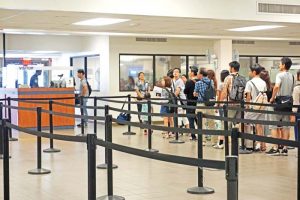‘We are the first line of defense’

Tourists line up for immigration processing at the Francisco C. Ada/Saipan International Airport. (Bea Cabrera)
U.S. Customs and Border Protection enforces the laws of 40 different federal agencies and being one of the Unites States’ first line of defense when it comes to customs and border protection is something they do with earnest intent.
“CBP officers and staff have as much invested in the islands as everybody else here. They care about the islands, they want to protect it, and they work really hard. These guys are here at least 40 hours week but majority of them are here 60 to 70 hours a week,” said CPB director Robert Havens.
CBP has been in the spotlight lately, mostly about the congestion and long lines that passengers in the night flight schedule have to go through at the airport’s arrival area. The night schedule from midnight to 6am is notorious for long immigration lines that last three to four hours.
According to Havens, most of the airlines that arrive in the night schedule come from China and the big challenge is processing each and every Chinese national that enter the CNMI—considered an entry to the United States of America.
It only takes a few minutes to process U.S. citizens, green card holders, and non-Chinese nationals that have U.S. tourist visas because they have been pre-vetted and Automated Passport Control machines at the airport installed by the Commonwealth Ports Authority hasten the processing of these individuals.
Chinese nationals who enter the CNMI usually don’t go through the process of getting a U.S. visa, like most countries. They do not acquire a visa in entering the CNMI, but a conditional parole.
“In other parts of the world, if one were to apply for a U.S. visa, you would have to sit in front of a consul, provide an application, have an interview, anywhere between 5 minutes to 15 minutes and they adjudicate and make a determination to issue you or not a U.S. visa.”
“During low season we get 1,200 to 1,500 people. During peak season we get 3,000 to 3,500 arrivals at the airport and, in all of that, 2,500 Chinese nationals in one day. Since the Chinese are not vetted before they get here, we have to do that basic interview on the line,” Havens added.
To maintain effective immigration control and check the eligibility of passengers, processing every Chinese national take up some time, Havens said.
“They have added documentary requirements such as I-94, I-736 forms to fill, show a valid passport, show proof that they have a non-refundable plane ticket, hotel room and we ask them the purpose of their trip to the United States,” he said.
The language barrier is also a factor in the prolonged time of processing Chinese passengers. According to Havens, the CBP has available translators. This helps them communicate with the passengers but it is a reality that this procedure takes time.
He said the previous issue with illegal workers who pose as tourists but eventually got jobs while in the CNMI kept CBP officers alert, hence the processing and extra vetting required.
“Those we find ineligible for entry, we send back. We have actually refused entry to a lot of them coming in this year,” he said.
Other issues the CBP faces are lack of manpower, limited facility, and computer efficiency issues that holds up the processing lines in the nighttime schedule at the airport.
“We are in the process of hiring more officers as we are aware that there is an issue with staffing. We have been told that we have many people in the pipeline that have been approved, passed the test on Saipan, and we are working on a lot of the tests to be done on island like the polygraph [test]. We are working on doing that for them and we are negotiating with CBP headquarters,” Havens said.
Even if the CBP has enough manpower, the current space in the airport will still not fix it, he said.
“In CPA’s defense, they have to work through CBP headquarters and it’s a very long and drawn-up process. CPA can go and knock down walls to expand the building but they have to get approval from CBP officers in the headquarters. It’s not an easy process,” Havens said.
“CBP knows we have a computer issue and the plan is to have 80 percent of our systems replaced. We are doing everything in our power to alleviate the CBP,” he added.
According to Havens, even if CBP hires more manpower, the current congestion and long lines will remain if new airlines will come in at night.
“A lot of the cause of delay in the lines is out of our control. The only thing we can is not letting a plane in. We don’t want to stop people and airlines from coming to the CNMI. We just ask the airlines to work with us and to find a better solution and not come during those peak hours, to fly off peak hours when we are not busy and we can handle those flights,” Havens said.
“It’s huge what we do. It’s a monumental task and we like to say we take our jobs very seriously. We understand that we are trusted with protecting the United States of America and everything in it. If we are wrong just one time, something bad happens and we won’t allow that,” he added.



























